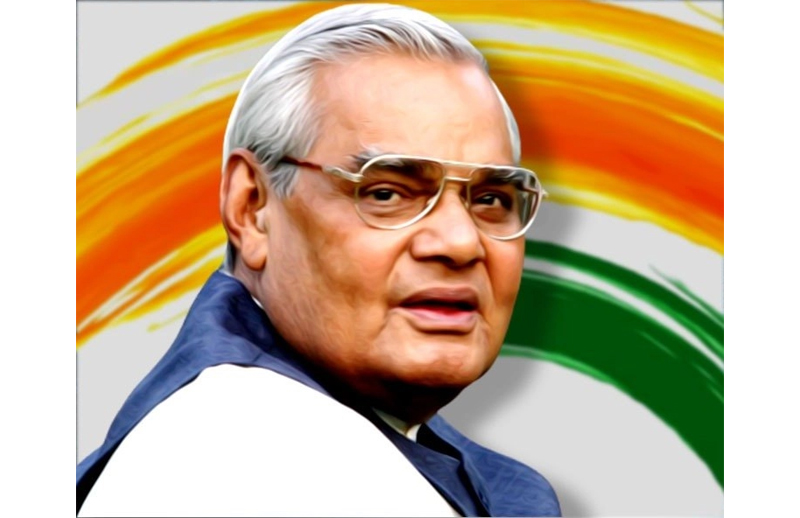Tarun Chugh
Prime Minister Narendra Modi is giving shape to Atalji’s thoughts. Bharat Ratna Atal Bihari Vajpayee was the confluence of honesty in life, decency in behaviour and simplicity in nature. Cleanliness in politics, good governance in Government and the influence of his thoughts in the lives of the people of the country was a hallmark of his political career. Atal Bihari Vajpayee, a sensitive litterateur, great patriot and Ajatshatru, will always be remembered. As a successful Prime Minister, his contribution to the country’s economic development and social welfare of the people was a guiding light for the India of the 21st century. Giving concrete shape to the same path, our Prime Minister Narendra Modi is building a prosperous and capable India. The great work done by his unflinching creativity and towering personality will always remain immortal in the nation. Bharat Ratna Atal Bihari Vajpayee was the real gem of India. He did politics by staying connected to the land and made his place in the hearts of the people.
Today, Prime Minister Narendra Modi is continuously taking forward his thoughts and the flow of development of the country. Atal Bihari Vajpayee has been called the visionary of India’s development because of his work as a politician and Prime Minister who established values and ideals in Indian politics. Whether it was to create a sense of dedication in the supporters or to win the hearts of the opponents, Atal Bihari Vajpayee, a multi-faceted personality, was the topper in both. His public life was very clean and due to this image and clean public life, Atal Bihari Vajpayee was respected by everyone. That’s why even his opponents were his admirers. National interest was always paramount for Atal ji. Whenever Atal Bihari Vajpayee used to speak in the Parliament, even his opponents could not say anything in front of his reasoned speech. At the same time, as a poet, Atal ji always attacked social evils through his poems. Atal Bihari Vajpayee, the man of the era, who traveled from the campaigner of the Rashtriya Swayamsevak Sangh to the Prime Minister, was born on 25 December 1924 on the occasion of the big day in Gwalior. Atal Bihari Vajpayee’s BA education took place at Victoria College, Gwalior, currently known as Laxmibai College. After graduating from Victoria College, Gwalior, Atal Bihari Vajpayee also received a master’s degree in arts from DAV College, Kanpur in first class.
He got the qualities of an intense speaker and poet from his father. Became a volunteer of the Rashtriya Swayamsevak Sangh since his student life. He also worked as a journalist in his life and for a long time edited many newspapers and magazines imbued with national spirit like Rashtradharma, Panchjanya and Veer Arjun. Atal Bihari Vajpayee was a founding member of the Bharatiya Jan Sangh and worked for a long time with nationalist leaders such as Dr. Syama Prasad Mukherjee and Pandit Deendayal Upadhyay. Atal Bihari Vajpayee was the National President of Bharatiya Jana Sangh from 1968 to 1973. For the first time in the Lok Sabha elections of 1957, he reached the Lok Sabha after winning as a Jana Sangh candidate from Balrampur Lok Sabha seat in Uttar Pradesh. He who was the leader of the Jansangh parliamentary party from 1957 to 1977, impressed even the first Prime Minister Pandit Jawaharlal Nehru with his fiery speeches. Atal Bihari Vajpayee’s personality was very friendly.
He openly opposed the imposition of Emergency in 1975. After the 1977 Lok Sabha elections, for the first time in the country, the Janata Party government was formed under the leadership of Morarji Desai, in which Atalji was made the foreign minister. As a foreign minister, he created the image of India in the whole world. As Foreign Minister, he became the first speaker of the country to deliver a speech in Hindi at the United Nations. After the split of the Janata Party in 1980, Atal Bihari Vajpayee along with his associate leaders founded the Bharatiya Janata Party and became the founding national president of the party. When the Bharatiya Janata Party emerged as the single largest party in the 1996 Lok Sabha elections, Atalji became the Prime Minister of the country after being unanimously elected as the leader of the parliamentary party. Unfortunately, this government lasted for 13 days only. In 1998, the BJP again emerged as the single largest party for the second time and he became the Prime Minister of the country for the second time. But this government could run only for 13 months. In this short tenure of 13 months, Atal Bihari Vajpayee, while being the Prime Minister, showed strong will power and made the whole world realize the power of India by conducting nuclear tests in Pokhran. Many countries, including the US and the European Union, imposed various restrictions on India, yet India was able to successfully deal with all kinds of challenges under the leadership of Atal Bihari Vajpayee.
In the 1999 Lok Sabha elections held after the victory in the Kargil War, the BJP again emerged as the single largest party under the leadership of Atal Bihari Vajpayee and formed a government in the form of a National Democratic Alliance with 13 parties under his leadership. Atal Bihari Vajpayee’s Government completed its full five-year term. During this tenure many dimensions of progress were touched in the country. Atalji’s government started the Golden Quadrilateral project to connect the four corners of India by road and Delhi, Calcutta, Chennai and Mumbai were connected by highway. For his oustanding contribution to the country, he was conferred upon India’s highest civilian award Bharat Ratna in 2013.
(The author is General Secretary BJP)


